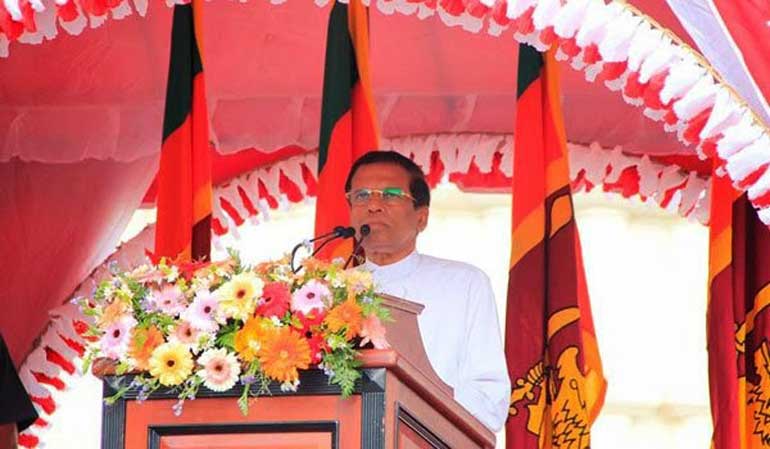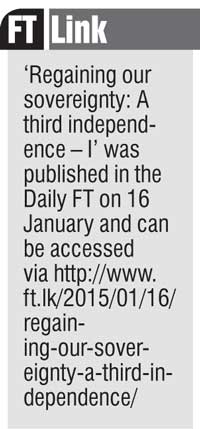Wednesday Feb 18, 2026
Wednesday Feb 18, 2026
Saturday, 11 July 2015 00:00 - - {{hitsCtrl.values.hits}}
 On the 8th of January this year we were given a new lease of time to build a better system, for our children and their children; many over the years paid dearly to bring about that change, some even paid the ultimate sacrifice; all to witness a new Executive addressing us from the historic Paththirippuwa assuring us that he did not wish to be “a king” but “a servant”. This was a victory!
On the 8th of January this year we were given a new lease of time to build a better system, for our children and their children; many over the years paid dearly to bring about that change, some even paid the ultimate sacrifice; all to witness a new Executive addressing us from the historic Paththirippuwa assuring us that he did not wish to be “a king” but “a servant”. This was a victory!
You will recall that the last I wrote was in January this year, on the 1st with a wish (see ‘My new year’s wish – a change of status quo’) and then when that ‘wish’ came true on the 8th, I followed up with another under the same title as above appearing elsewhere in the press; from then until now I have been relatively “silent” and for good reason.
Mostly (I dare admit) political hibernation, driven by a desire to allow the new regime to do something; not be a thorn in their side even before they start. Also I too found myself posted in some relatively insignificant corners of Legislative/Executive Government (not my familiar Judicial arm) where I attempted, as much as I could, to try and make that “difference” that we clamoured for; which I sincerely thought we will achieve after the victory of the people on the 8th and hence my title “3rd Independence”.
However since then I have been quick to admit that I may have been dreaming too much, too soon; I have now resigned from some of these places (where I felt I could not make any worthwhile contribution) and may very well leave the remaining as well, soon. Therefore I am free to dream again as an ordinary citizen, particularly with a new Parliament just around the corner and re-awaken from my editorial slumber; to critically comment on the six months gone by, of what has popularly been termed the ‘yahapalayana’ regime and more importantly, on what we ought to search for going to the future for the sake of the generations yet unborn. Remember, our sovereign power is back in our hold until the 17th of next month, with a dissolved Legislature and a pro tem Cabinet – so what we say now, goes!

19th/20th Amendment fiasco
So what really happened to the people’s dreams during that whirlwind election campaign that suddenly erupted, that led to an unprecedented near 82% voter turnout to make that change on 8 January? For the first time in my life I too became “politically active”, obviously caught up in the emotion of the moment; shouting at the top of our lungs and calling for sweeping electoral reforms, drastic curtailing of executive power, etc. – have we got it? If not who really let us down? These are questions we must seriously consider before we proceed to cast our vote next month.
I was also initially invited to Temple Trees to be part of (what was informed to me as a five-member) committee chaired by the Prime Minister to draft the 19th Amendment. The proposals at that stage were very progressive and would have strengthened democracy greatly; however for some strange reason (which I can reasonably assimilate now) the invites to what became a much larger gathering suddenly discontinued; I too was not that keen to pursue it thinking if they needed me, they will call me as they did the first time – they didn’t! So the next time I saw that draft was when we argued its constitutionality in the Supreme Court, which by then was a much more “filtered down version”; certainly not delivering all that we had originally dreamt it would be.
As compared to that, I never had any direct input with the 20th Amendment, which was once again a promise to the people during our presidential campaign; this would have certainly changed our electoral system for the better, but once again for reasons all of you know by now, it never saw the light of day! Thus the question remains, if the 4th of February ’48 was our first independence and the 19th of May ‘07 our second; have we the people reaped the maximum from what was most certainly our third on the 8th of January this year; the day ordinary Sri Lankans marched into action against what was seen as an indefatigable force of abuse, corruption, tyranny and autocracy and reclaimed our sovereign right in Article 3, to govern ourselves?
(a) Legislative and (B) Executive Government – The Parliament
Now we have another opportunity to pick our Parliament, from which the (a) Legislative and (b) Executive part of our sovereign power will be exercised over the next five years. What does this entail? What must we look for in these members when we pick them? There are many misconceptions that have either set in over years of acceptance in the breach or simply dishonest misdirection by the politicians themselves, some of which I felt we need to discuss:
nWisdom or education: There are many parts of society that are demanding, perhaps having seen the gutter that some elected members appear to be emanating from, for at least a minimum educational qualification. Not a bad idea but will an educational certificate alone manifest “wisdom” to govern? Certainly it may be a practical way of filtering out the undesirable, at least until we find a better way, but we cannot forget that even those without qualifications have a fundamental right to franchise; that includes both its exercise as well as to seek election. Also history has enough examples of many who were “wise” but hardly stepped into a university! I believe the political parties are the best placed for this task of selecting candidates, not hide from that responsibility by claiming a lacuna in the law; let them place the right individuals before us for election and if not, we must simply reject them, even if it means defeating out father’s and grandfather’s political party; let them learn a lesson at least this time!
n A member to build your road/school: Another subject of much discussion during the recent 20th Amendment proposals was that we needed to revert to a “first past the post” (electoral) system from the present proportionate representations. Why? The common answer was that we needed a known person from our area to get our road cleared or build culverts or get a teacher for our school – wrong answer! On the 17th of August you will pick 225 people to make laws to govern us over the next five years (to Legislate), from amongst whom a Cabinet of Ministers will be picked to formulate fiscal, economic, international, educational and other such policies (to Execute) them, along constitutional guidelines (Article 27 – Directive Principles of State Policy); so don’t be misled by these professional con-artists who proclaim to be your best friend during this time of campaigning, whom you may never see again for the next five years. Pick individuals whom you feel are of sufficient integrity, wisdom, courage and national standing to carry out these Legislative or Executive functions. If you need “a friend” to invite for your social gathering from the area, think of the provincial councillor or the town councillor; they are the ones required by law to monitor the roads, run the schools and hospitals in your area, not the parliamentarian.
Green vs. Blue – what’s the difference, really?
There is another question that has been troubling me from a political-scientists point of view for some time now; are we addressing “the policy” of a party when we pick whom to vote – really?
I dare say from the early ’50s leading up to the late ’70s there was a clear demarcation on policy angles between the traditional “blue” and “green” camps; from a more social welfare and agro based economic policy and a non-aligned foreign footing of the Bandaranaike eras of the former, to the more free market, laissez faire, import/export economies and pro-Western foreign alliances of the Senanayake-Jayawardene eras of the latter; but what of this distinction now?
Ever since the embracing of liberal-democratic stances by both camps commencing in the early ’90s (calling it by different catchy names – like “giving a friendly face” used by the Bandaranaike Kumaratunga manifesto) can we still claim that an actual difference exists between the two sides? Or are we not simply changing one set of the “same type” to another set of different colours, two sides of the same coin; simply based on our “liking” of one group over the other at that particular time? If so, are we voting with our mind or with our heart? Is this how an intelligent citizen is expected to make the choice of who will govern us for the next five years, based on what colour our forefathers voted for, or which candidates belong to our social class or wear the same school tie?
If your conscience is dictating otherwise at least at this juncture, that this is not a rational way of selecting the persons on whom you will vest the above important constitutional duties, then should you not at least on this occasion choose to think differently? Maybe we should look at the individual first, his/her capabilities (avoiding to look at the colour/symbol first) and then look at what party/colour/symbol that person belongs to and mark a cross there; are we ready to take that bold step at least this time?
Yes we’re late – but do we abandon our victory or keep trying on the 17th?
On the 8th of January this year we were given a new lease of time to build a better system, for our children and their children; many over the years paid dearly to bring about that change, it did not come automatically; it was a build-up of over years of suffering by the masses for the enjoyment of super-luxury lifestyles by a few. Some even paid the ultimate sacrifice, disappeared in white vans, swam with sharks in specially built tanks; all to witness a new Executive addressing us from the historic Paththirippuwa assuring us that he did not wish to be “a king” but “a servant”. This was a victory! 
Now we may not have built on that victory properly since then, mistakes may have been made and there may have also been valid reasons as to why much more could not be accomplished; but does that mean that we give up now? Destroy all that we accomplished simply over the failure of a few months or may even be a few wrong people? I say no! The loss is relative and only a mini-battle; the war is yet to be fought and won, so let us rest, recuperate, consolidate and build on from here.
On the 8th we looked at defeating a corrupt regime and President Sirisena was the figure around whom we gathered to do that; that camp was backed by the UNP, JVP (in a round-about way) and several others. On the 17th of August however our horizons must shift wider, we’re not looking at a person but a team to guide and lead us to the next level; not just one or two individuals, we need to remember that as foremost in our minds. It is therefore imperative for us to look deeply at the policy, capability and integrity of “the person” before you, not “the party” that places him/her before you.
I would like to repeat that bit of history I wrote in January ... John Adams was asked at the French Court (at the time of building the Union) as to why he was wasting so much time in politics when there were so many artistic and cultural distractions in gay Paris. His answer was prompt and eloquent; (something to the context of) “… Madam, I take pains in the study of politics today so that my children may one day take up the study of mathematics and sciences, so that their children may then, one day, enjoy the leisure of admiring the arts and culture …”; the last thing we must do is to be disillusioned over what we may not have accomplished over this last 100 days or so and stay away from the polls – no, for goodness sake, go and cast your vote!
Ithin hadamu denwath aluth ratak!!! (At least now, let us build a better country.)